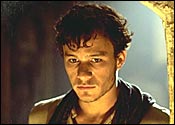
|
The Storm and The Fury
Shekhar Kapur's The Four Feathers has credibility issues, but provides rousing entertainment
|
Arthur J Pais
With deftly staged battle scenes, several intriguing characters, excellent performances from four main characters, and haunting music, the lavishly mounted The Four Feathers offers rousing entertainment -- and something to think about colonialism and its continuing bloody legacy leading to 9/11 and beyond.
But it also has several problems in the script, the work of two writers, Michael Schiffer and Hossein Amini, who have taken a revisionist approach to A E W Mason's novel with a strong British patriotic bite. This is the fifth movie based on Mason's work. Arguably, it is the best. But the problems in the script have remained despite Shekhar Kapur's assured direction and earnest acting by Heath Ledger, Wes Bentley, Kate Hudson and Djimon Hounsou.
Essentially, the movie revolves around Harry Feversham (Ledger) who loses his honour and fianc้ (Hudson) when he suddenly drops out of the army on the eve of a crucial battle in Sudan in the late 19th century. The British army is facing a bloody uprising there led by the fiery and charismatic Mahdi.
When Feversham realizes his friends, including those who had given him four feathers to mark what they perceive as his cowardice, are in danger in Sudan he slips into the country disguised as an Arab. His success is largely due to the help he receives from a mysterious Sudanese man (Hounsou). Feversham carries his mission without letting his friends know of his identity. One of them, whose life he saves, loses his eyesight. He arrives in England and Ethne (Feversham's fianc้) consents to marry him, fearing that Feversham has died.
There is no surprise in the movie's conventional but audience-pleasing ending but surprises and doubts are aplenty throughout the film.
Feversham's decision to drop out of the army is seen as a cowardly act by his friends. But what exactly was he thinking?
Ledger has said in interviews he does not think it was cowardice that kept his character back. To have gone to war without strong convictions would have been the real cowardly act, he has said. The script could have clarified whether it was his suddenly awakened pacific nature or his opposition to colonialism or perhaps it was just emotional chaos that led him to the momentum decision.
The character of Abou Fatma, the guardian angel-like figure who helps Feversham through the most difficult journey in Sudan, will be discussed at length by the audiences. It is an intriguing part and Hounsou does even a better job with it than his work in his first film, Amistad and then in Gladiator.
But who exactly is Fatma? The mystery surrounding his character would not have posed a problem but for the fact that he is a black man, and in Sudan, it is the blacks who are fighting the white colonialists.
At the film's gala premiere September 8 at the Toronto International Film Festival some people wondered if Fatma had some grouse against his black brethren and had decided to help Feversham to avenge some humiliation.
And then there is the journey itself and a key credibility issue it raises. Feversham travels with a group of Africans disguised as an Arab. Though one or two people in the group are suspicious of him, the others accept him.
If the audiences have no credibility problems with the above issues, they should be able to enjoy it considerably.
Kapur, splendidly assisted by cinematographer Robert Richardson and composer James Horner (with lingering vocals by Rahmat Nusrat Fateh Ali Khan), has created a passionate piece of work. He had intended to show it as an example of the folly of colonialism. He does succeed in doing so in many places, especially early on in Sudan when a young man with a gun is killed in cold blood by an arrogant, young British soldier. But we never get to feel in our guts the pain and anguish of the Sudanese, though we constantly watch their anger against the British.
The movie is set in late 19th century Sudan and England but the issues it deals with including pacifism, patriotism, nationalism, and the nature of betrayal are alive today, particularly the disdain many people worldwide have for the West.
Also read:
'We don't make films like this anymore'
Shekhar Kapur unveils his new film
Deepa Mehta's Bollywood/ Hollywood premieres at Toronto
Bollywood/Hollywood off to Toronto
Controversial Turk film to open at Toronto
9/11 film hotly debated at Toronto
The Indian presence at Toronto
Tell us what you think of this review